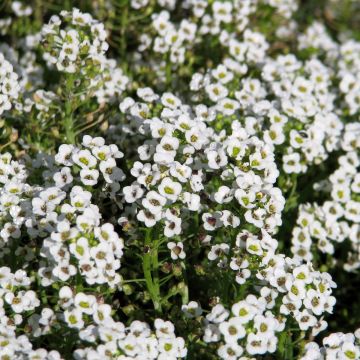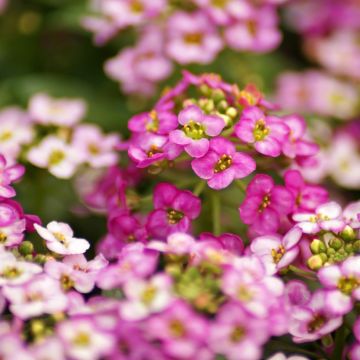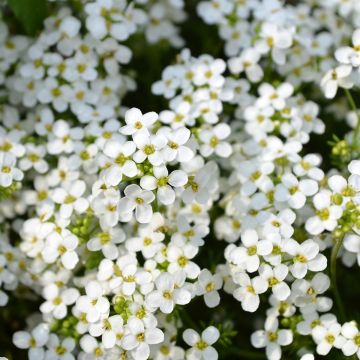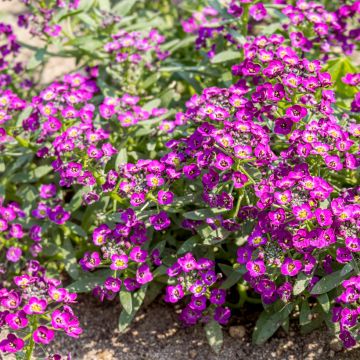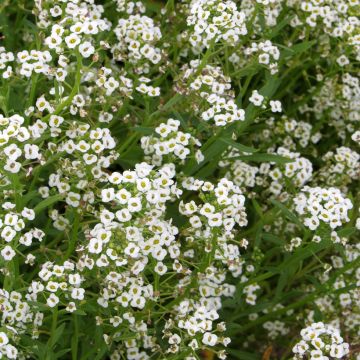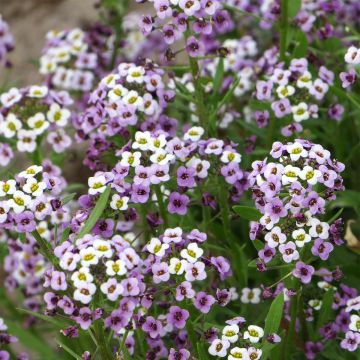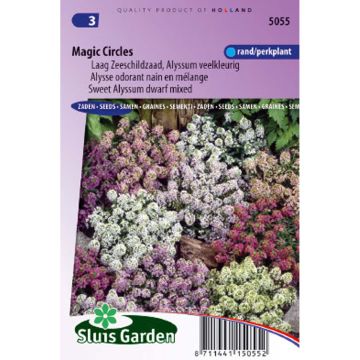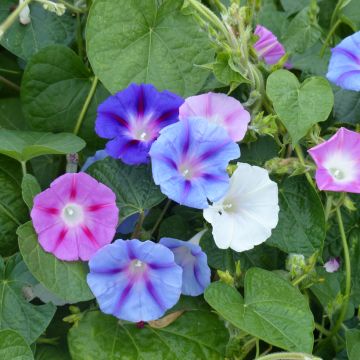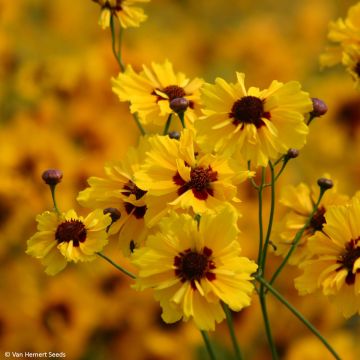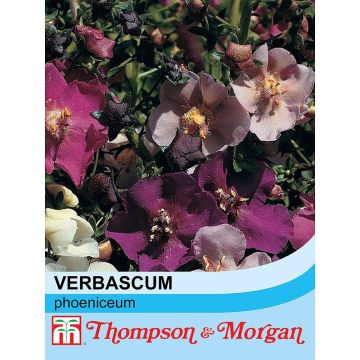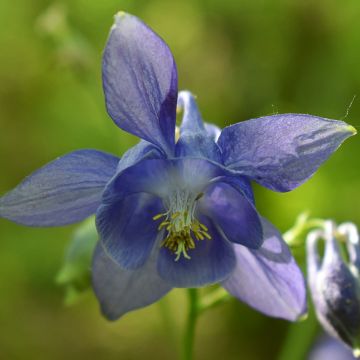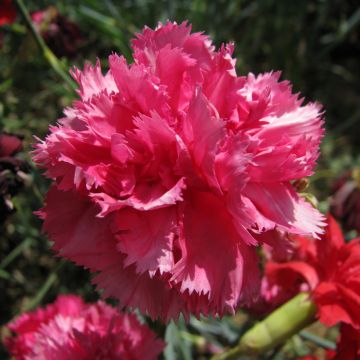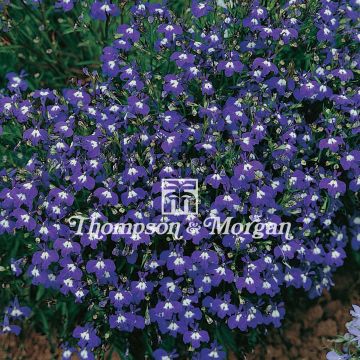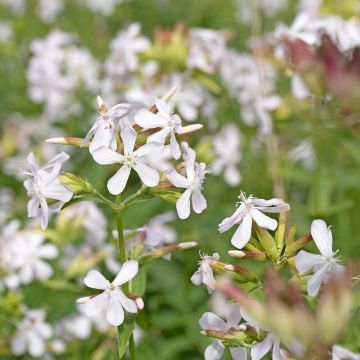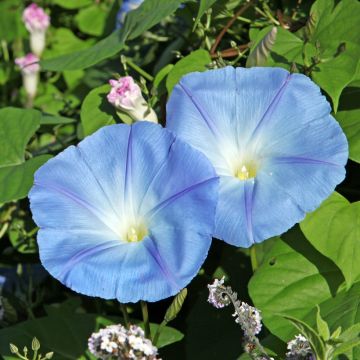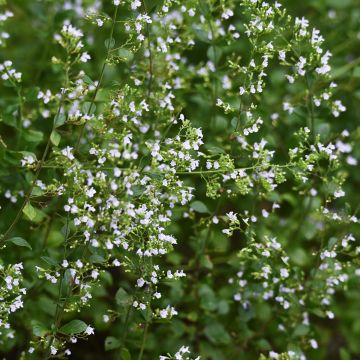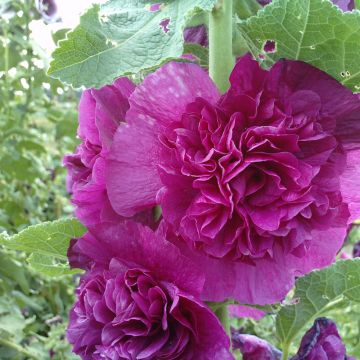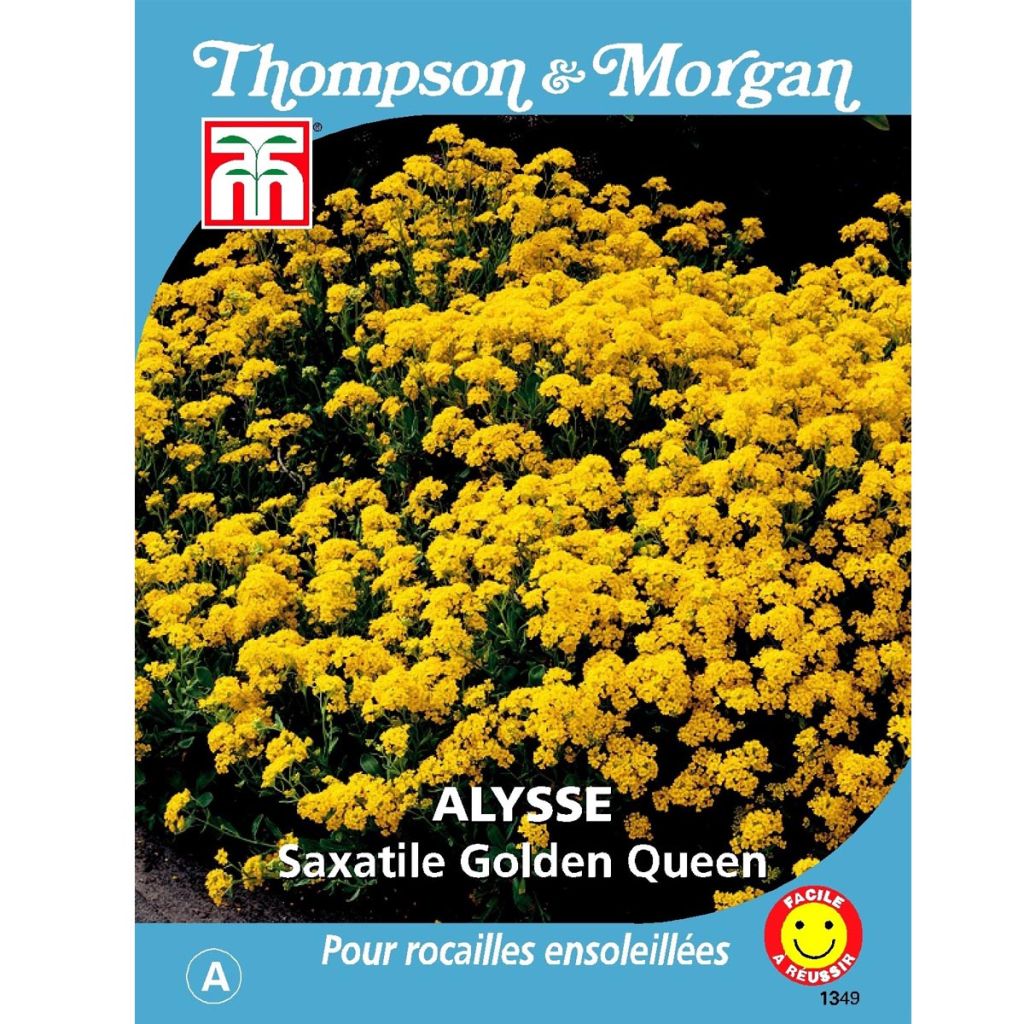

Alyssum saxatile Golden Queen - Basket of Gold
Alyssum saxatile Golden Queen - Basket of Gold
Alyssum saxatile Golden Queen
Auriana saxitalis
Why not try an alternative variety in stock?
View all →This plant carries a 6 months recovery warranty
More information
We guarantee the quality of our plants for a full growing cycle, and will replace at our expense any plant that fails to recover under normal climatic and planting conditions.
Seed-only orders are dispatched by sealed envelope. The delivery charge for seed-only orders is €3.90.
Does this plant fit my garden?
Set up your Plantfit profile →
Description
Alyssum saxatile 'Golden Queen' is a hardy and compact perennial that is truly worthy of its name! It produces masses of small, bright golden-yellow blooms in spring over silvery green foliage that is evergreen in milder climates. Dazzling in rock gardens, hanging baskets and pots, it needs plenty of sun and well-drained soil. Ideal for dry sites with poor, stony or chalky ground.
Alyssum saxatile, commonly known as Basket of Gold, is a mat-forming, woody-based perennial plant that belongs to the Brassicaceae family alongside cabbage and mustard. It is native to the dry, rocky mountainous regions of Europe and North America. 'Golden Basket' has a compact habit (25 cm high, 30 cm wide), forming dense, spreading mounds of bright yellow flowers in spring. The 4-petalled flowers are gathered in clusters (corymbs). The semi-evergreen to evergreen grey-green leaves are petiolate, alternate, ovate to obovate in shape and covered in fine, silvery hairs.
Basket of Gold is one of those plants that really bends over backwards to make spring one of the most colourful times of the year! It comes to life shortly after forsythias and at the same time as tulips. This easy to grow, low-maintenance perennial does best in full sun in well-drained soil. It is ideal for stony, dry soil and will squeeze in just about anywhere: in rock gardens, over retaining stone walls, in troughs or hanging baskets. It is useful for softening the edges of borders and flowerbeds or as low-growing ground cover and pairs well with blue and purple rock cress.
Report an error about the product description
Flowering
Foliage
Plant habit
Botanical data
Alyssum
saxatile
Golden Queen
Brassicaceae
Auriana saxitalis
Aurinia saxatilis
Cultivar or hybrid
Other Alyssum seeds
Planting and care
Sow from late March to May on the surface of good quality sowing mix at a temperature of 15-29°C. Cover the seeds with a fine layer of compost or vermiculite. Make sure to give them enough light to germinate and to keep the soil moist (but not soggy!). To speed up the process, use a propagator or place the seed tray inside a polyethylene bag until germination (7-30 days).
When the plants are strong enough to handle, transplant them into pots and move them to a cooler place until they are ready to taken outdoors. When the young plants are well established and all risk of frost is over, harden them off for 7 to 10 days then plant them out in a sunny location with light, sandy to stony, well-drained soil. Make sure to leave about 30 cm between each plant. It is also possible to direct sow your alyssum seeds in the garden in May, in light, well-prepared soil. Plants grown in pots must be watered regularly during the growing and flowering period.
Sowing period
Intended location
This item has not been reviewed yet - be the first to leave a review about it.
Flower seeds
Haven't found what you were looking for?
Hardiness is the lowest winter temperature a plant can endure without suffering serious damage or even dying. However, hardiness is affected by location (a sheltered area, such as a patio), protection (winter cover) and soil type (hardiness is improved by well-drained soil).

Photo Sharing Terms & Conditions
In order to encourage gardeners to interact and share their experiences, Promesse de fleurs offers various media enabling content to be uploaded onto its Site - in particular via the ‘Photo sharing’ module.
The User agrees to refrain from:
- Posting any content that is illegal, prejudicial, insulting, racist, inciteful to hatred, revisionist, contrary to public decency, that infringes on privacy or on the privacy rights of third parties, in particular the publicity rights of persons and goods, intellectual property rights, or the right to privacy.
- Submitting content on behalf of a third party;
- Impersonate the identity of a third party and/or publish any personal information about a third party;
In general, the User undertakes to refrain from any unethical behaviour.
All Content (in particular text, comments, files, images, photos, videos, creative works, etc.), which may be subject to property or intellectual property rights, image or other private rights, shall remain the property of the User, subject to the limited rights granted by the terms of the licence granted by Promesse de fleurs as stated below. Users are at liberty to publish or not to publish such Content on the Site, notably via the ‘Photo Sharing’ facility, and accept that this Content shall be made public and freely accessible, notably on the Internet.
Users further acknowledge, undertake to have ,and guarantee that they hold all necessary rights and permissions to publish such material on the Site, in particular with regard to the legislation in force pertaining to any privacy, property, intellectual property, image, or contractual rights, or rights of any other nature. By publishing such Content on the Site, Users acknowledge accepting full liability as publishers of the Content within the meaning of the law, and grant Promesse de fleurs, free of charge, an inclusive, worldwide licence for the said Content for the entire duration of its publication, including all reproduction, representation, up/downloading, displaying, performing, transmission, and storage rights.
Users also grant permission for their name to be linked to the Content and accept that this link may not always be made available.
By engaging in posting material, Users consent to their Content becoming automatically accessible on the Internet, in particular on other sites and/or blogs and/or web pages of the Promesse de fleurs site, including in particular social pages and the Promesse de fleurs catalogue.
Users may secure the removal of entrusted content free of charge by issuing a simple request via our contact form.
The flowering period indicated on our website applies to countries and regions located in USDA zone 8 (France, the United Kingdom, Ireland, the Netherlands, etc.)
It will vary according to where you live:
- In zones 9 to 10 (Italy, Spain, Greece, etc.), flowering will occur about 2 to 4 weeks earlier.
- In zones 6 to 7 (Germany, Poland, Slovenia, and lower mountainous regions), flowering will be delayed by 2 to 3 weeks.
- In zone 5 (Central Europe, Scandinavia), blooming will be delayed by 3 to 5 weeks.
In temperate climates, pruning of spring-flowering shrubs (forsythia, spireas, etc.) should be done just after flowering.
Pruning of summer-flowering shrubs (Indian Lilac, Perovskia, etc.) can be done in winter or spring.
In cold regions as well as with frost-sensitive plants, avoid pruning too early when severe frosts may still occur.
The planting period indicated on our website applies to countries and regions located in USDA zone 8 (France, United Kingdom, Ireland, Netherlands).
It will vary according to where you live:
- In Mediterranean zones (Marseille, Madrid, Milan, etc.), autumn and winter are the best planting periods.
- In continental zones (Strasbourg, Munich, Vienna, etc.), delay planting by 2 to 3 weeks in spring and bring it forward by 2 to 4 weeks in autumn.
- In mountainous regions (the Alps, Pyrenees, Carpathians, etc.), it is best to plant in late spring (May-June) or late summer (August-September).
The harvesting period indicated on our website applies to countries and regions in USDA zone 8 (France, England, Ireland, the Netherlands).
In colder areas (Scandinavia, Poland, Austria...) fruit and vegetable harvests are likely to be delayed by 3-4 weeks.
In warmer areas (Italy, Spain, Greece, etc.), harvesting will probably take place earlier, depending on weather conditions.
The sowing periods indicated on our website apply to countries and regions within USDA Zone 8 (France, UK, Ireland, Netherlands).
In colder areas (Scandinavia, Poland, Austria...), delay any outdoor sowing by 3-4 weeks, or sow under glass.
In warmer climes (Italy, Spain, Greece, etc.), bring outdoor sowing forward by a few weeks.

































